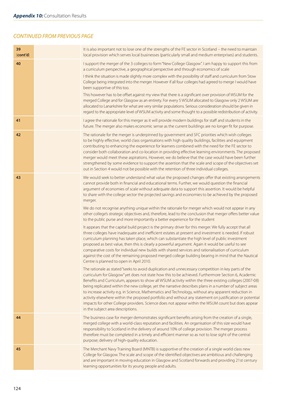
124
CONTINUED FROM PREVIOUS PAGE
39
(cont'd)
It is also important not to lose one of the strengths of the FE sector in Scotland - the need to maintain
local provision which serves local businesses (particularly small and medium enterprises) and students.
40 I support the merger of the 3 colleges to form "New College Glasgow". I am happy to support this from
a curriculum perspective, a geographical perspective and through economics of scale
I think the situation is made slightly more complex with the possibility of staf and curriculum from Stow
College being integrated into the merger. However if all four colleges had agreed to merge I would have
been supportive of this too.
This however has to be of set against my view that there is a signii cant over provision of WSUM for the
merged College and for Glasgow as an entirety. For every 5 WSUM allocated to Glasgow only 2 WSUM are
allocated to Lanarkshire for what are very similar populations. Serious consideration should be given in
regard to the appropriate level of WSUM activity and some thought to a possible redistribution of activity.
41 I agree the rationale for this merger as it will provide modern buildings for staf and students in the
future. The merger also makes economic sense as the current buildings are no longer i t for purpose.
42 The rationale for the merger is underpinned by government and SFC priorities which wish colleges
to be highly ef ective, world class organisations with high quality buildings, facilities and equipment
contributing to enhancing the experience for learners combined with the need for the FE sector to
consider both collaboration and co-location in providing ef ective learning environments. The proposed
merger would meet these aspirations. However, we do believe that the case would have been further
strengthened by some evidence to support the assertion that the scale and scope of the objectives set
out in Section 4 would not be possible with the retention of three individual colleges.
43 We would seek to better understand what value the proposed changes of er that existing arrangements
cannot provide both in i nancial and educational terms. Further, we would question the i nancial
argument of economies of scale without adequate data to support this assertion. It would be helpful
to share with the college sector the projected savings and economies to be achieved by the proposed
merger.
We do not recognise anything unique within the rationale for merger which would not appear in any
other college's strategic objectives and, therefore, lead to the conclusion that merger of ers better value
to the public purse and more importantly a better experience for the student
It appears that the capital build project is the primary driver for this merger. We fully accept that all
three colleges have inadequate and inei cient estates at present and investment is needed. If robust
curriculum planning has taken place, which can substantiate the high level of public investment
proposed as best value, then this is clearly a powerful argument. Again it would be useful to see
comparative costs for individual new builds with shared services and rationalisation of curriculum
against the cost of the remaining proposed merged college building bearing in mind that the Nautical
Centre is planned to open in April 2010.
The rationale as stated "seeks to avoid duplication and unnecessary competition in key parts of the
curriculum for Glasgow" yet does not state how this to be achieved. Furthermore Section 6, Academic
Benei ts and Curriculum, appears to show all WSUM activity within the three existing colleges (2007-08)
being replicated within the new college, yet the narrative describes plans in a number of subject areas
to increase activity e.g. in Science, Mathematics and Technology, without any apparent reduction in
activity elsewhere within the proposed portfolio and without any statement on justii cation or potential
impacts for other College providers. Science does not appear within the WSUM count but does appear
in the subject area descriptions.
44 The business case for merger demonstrates signii cant benei ts arising from the creation of a single,
merged college with a world-class reputation and facilities. An organisation of this size would have
responsibility to Scotland in the delivery of around 10% of college provision. The merger process
therefore must be completed in a timely and ei cient manner so as not to lose sight of the central
purpose; delivery of high-quality education.
45 The Merchant Navy Training Board (MNTB) is supportive of the creation of a single world class new
College for Glasgow. The scale and scope of the identii ed objectives are ambitious and challenging
and are important in moving education in Glasgow and Scotland forwards and providing 21st century
learning opportunities for its young people and adults.
Appendix 10: Consultation Results